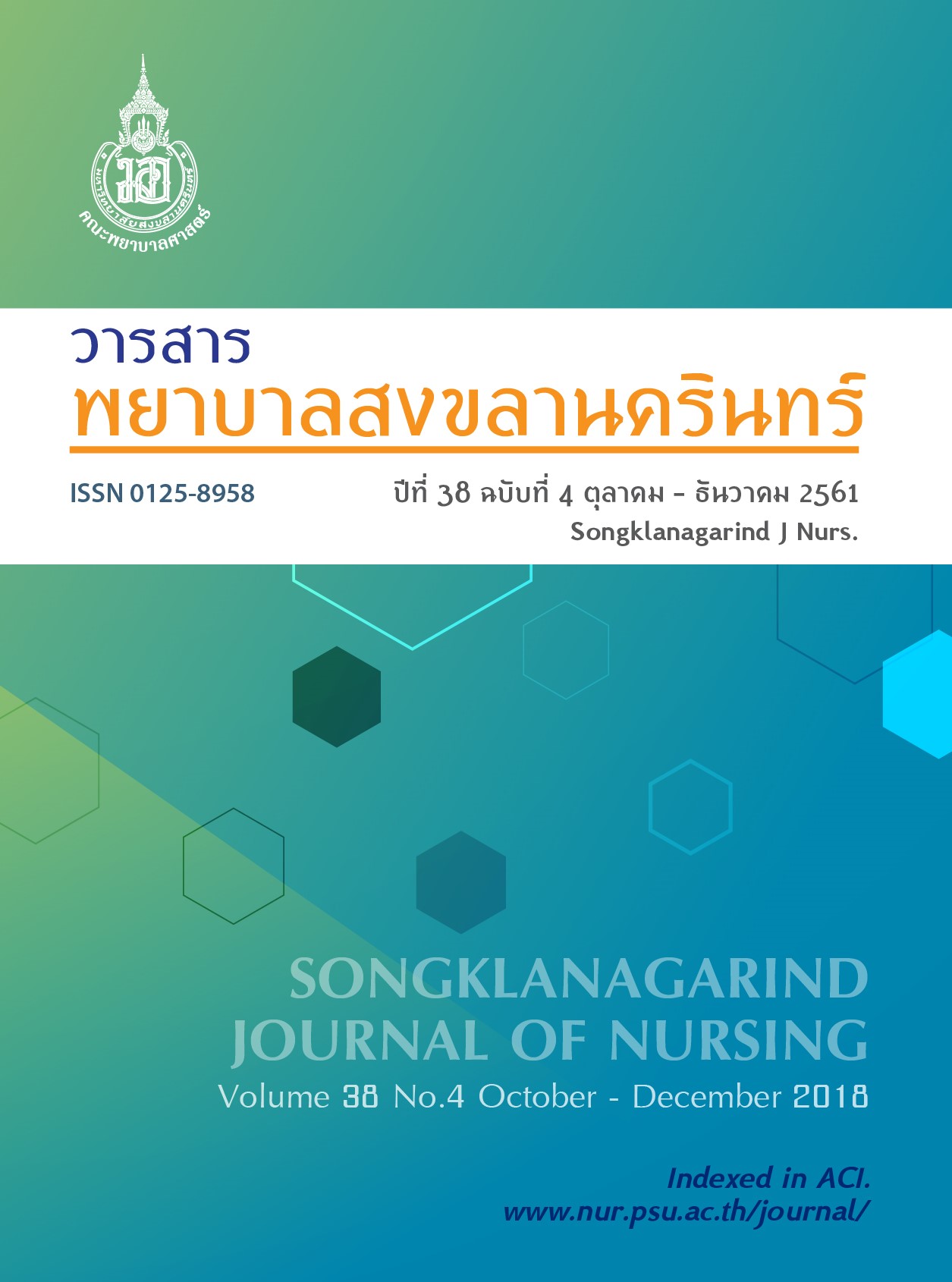Nurses’ Competencies in Promoting, Supporting, and Protecting Breastfeeding as Perceived by Nurses and Postpartum Mothers
Main Article Content
Abstract
This quasai-experimental research aimed to compare perception on nurses’ competencies in promoting, supporting, and protecting breastfeeding between nurses and postpartum mothers. The samples were 30 nurses and 60 postpartum mothers. The research instruments were perception of nurses’ and postpartum mothers’ competencies in promoting, supporting, and protecting breastfeeding questionnaires. The content validity was approved by 3 experts. Reliability of the questionnaires were tested and yielded Cronbach’s alpha coefficient of .90 and .86 respectively. Descriptive statistics and t-test were used for data analysis.
The mean score of nurses’ perception on competencies in promoting, supporting, and protecting breastfeeding significantly higher than those of postpartum mothers (t=3.359, p< .01).
Therefore, nurses should develop competencies in promoting, supporting, and protecting breastfeeding to sustain postpartum mothers’ need and promoting, supporting exclusive breastfeeding in postpartum mother.
Article Details
References
2. Salone LR, Vann WF, Dee DL. Breastfeeding: An overview of oral and general health benefits. J Am Dent Assoc 2013; 144: 143-51.
3. Chaput KH, Adair CE, Nettel-Aguirre A, et al. The experience of nursing women with breastfeeding support: a qualitative inquiry. Can Med Assoc J 2015; 3: E305-E9. doi: 10.9778/cmajo.20140113.
4. Watkins AL, Dodgson JE. Breastfeeding educational interventions for health professionals: A synthesis of intervention studies. J Spec Pediatr Nurs 2010; 15: 223-32. doi: 10.1111/j.1744-6155. 2010.00240.x.
5. Fox R, McMullen S, Newburn M. UK women’s experiences of breastfeeding and additional breastfeeding support: A qualitative study of Baby Café services. BMC Pregnancy Childbirth. 2015; 15: 147. doi 10.1186/s12884-015-0581-5
6. Schmied V, Beake S, Sheehan A, et al. Women’s perceptions and experiences of breastfeeding support: a metasynthesis. Birth 2011; 38: 49-60. doi: 10.1111/j.1523-536X.2010.00446.x.
7. Yantaporn C, Rattasumpun P, Pakdevong N. Effects of Enhancing Self-Efficacy Program on Nurses’ Self-Efficacy and Breastfeeding Promotion Behavior. Journal of Nurses’ Association of Thailand, North-eastern Division 2012; 30: 33-41. Thai.
8. Sinsuksai N. Policies, situations, and trends of breastfeeding. In: Wijitsukon K, Saengperm P, Watayu N, et al. Editors. Breastfeeding. Bangkok: Pre-One; 2013; p. 1-10. Thai.
9. Ratisunthorn J, Thaithae S, Bowanthammajak U. Effects of empowerment program on breastfeeding behavior and duration of exclusive breastfeeding among adolescent mothers. Kuakarun Journal of Nursing 2014; 21: 139-54. Thai.
10. UNICEF. Thailand addressing the gaps: key results from the multiple indicator cluster survey 2012. Bangkok: UNICEF Thailand; 2014. Thai.
11. Schmied V, Gribble K, Sheehan A, et al. Ten steps or climbing a mountain: A study of Australian health professionals’ perceptions of implementing the baby friendly health initiative to protect, promote, and support breastfeeding. BMC Health Serv Res. 2011; 11(208). doi: 10.1186/1472-6963-11-208.
12. Chisuwan C, Prasopkittikun T, Sangperm P, et al. Predictive power of support from husbands, grandmothers, and nurses on duration of exclusive breastfeeding. J Nurs Sci 2012; 30: 70-80.
13. Hauck YL, Fenwick J, Dhaliwal SS, et al. The association between women’s perceptions of professional support and problems experienced on breastfeeding cessation: A Western Australian study. J Hum Lact 2011; 27: 49-57. doi:10.1177/0890334410386956.
14. Chanapai S, Sinsuksai N, Thananowan N, et al. Knowledge, attitude, self-efficacy, spousal and nurse support predicting 6-weeks exclusive breastfeeding. J Nurs Sci 2014; 32: 51-60. Thai.
15. Bernaix LW, Beaman ML, Schmidt CA. et al. Success of and educational intervention on maternal/newborn nurses’ breastfeeding knowledge
and attitudes. J Obstet Gynecol Neonatal Nurs 2010; 39: 658-66. doi: 10.1111/j.1552-6909.2010.01184.x.
16. Wungkum A, Thaiyapirom N, Jintrawet U. Factors Related to Continued Breast Feeding among Mothers with Preterm Infants. Nursing Journal 2011; 38: 73-85. Thai.
17. Panbangpra S, Sangperm P. Knowledge, attitude, and practice of breastfeeding promotion among nurses in private hospitals. J Nurs Sci 2013; 31: 70-9. Thai.
18. Backstrom CA, Wahn EIH, Ekstrom AC. Two sides of breastfeeding support: experiences of women and midwives. Int Breastfeed J 2010; 29 (5):20. doi: 10.1186/1746-4358-5-20.
19. Varghese J, Rajagopal K. A study to evaluate the level of satisfaction perceived by postnatal mothers following nursing care in postnatal wards as expressed by themselves: pilot study. Journal of Biology, Agriculture and Healthcare 2012; 2: 101-11.
20. McClelland DC. A competency model for human resource management specialist to be used in the delivery of the human resource management cycle. Boston: Mcber; 1975.
21. Wijitsukon K, Saengperm P, Watayu N, et al. Editors. Breastfeeding. Bangkok: Pre-One; 2013.
22. The committees of manual and media for breastfeeding. Document for breastfeeding workshop for registered nurses. In press; 2014.
23. Lipsey MW. Design sensitivity: Statistical power for experimental research. London: Sage; 1990.
24. Hoddinott P, Britten J, Pill R. Why do interventions work in some place and not others: A breastfeeding support group trial. Soc Sci Med 2010; 70: 769-78. doi: 10.1016/j.socscimed.2009.10.067.
25. Brown A, Raynor P, Lee M. Healthcare professionals’ and mothers’ perceptions of factors that influence decisions to breastfeed or formula feed infants: A comparative study. J Adv Nurs 2011; 67: 1993-2003. doi: 10.1111/j.1365-2648.2011.05647.x.
26. Meedya S, Fahy K, Kable A. Factors that positively influence breastfeeding duration to 6 months: a literature review. Women Birth 2010; 23: 135-45. doi: 10.1016/j.wombi.2010.02.002.
27. Hammes T, Sebold LF, Kempfer SS, et al. Nursing care in postpartum adaptation: perceptions of Brazilian mothers. Journal of Nursing Education and Practice 2014; 4: 125-33. doi: 10.5430/jnep.v4n12p125
28. Agunbiade OM, Ogunleye OV. Constraints to exclusive breastfeeding practice among breastfeeding mothers in Southwest Nigeria: implications for scaling up. Int Breastfeed J. 2012; 7(5). doi: 10.1186/1746-4358-7-5.
29. Al-Akour NA, Gharaibeh M, Al-Sallal RAK. Perception of Jordanian mothers to nursing support during their children hospitalization. J Clin Nurs. 2013; 22: 233-9. doi: 10.1111/j.1365-2702.2012.04278.x
30. Gleeson D, Flowers K, Fenwick J. Midwives’ time and presence: A key factor in facilitating breastfeeding support for new mothers. International Journal of Children. 2014; 4(4): 219-27. doi: 10.
1891/2156-5287.4.4.219.


